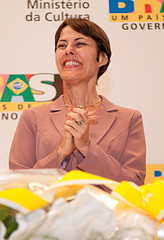 A public letter from activists, academics and artists to the recently appointed Brazilian Minister of Culture, Ana de Hollanda, is currently requesting the continuation of the copyright reform and is open for worldwide signatures.
A public letter from activists, academics and artists to the recently appointed Brazilian Minister of Culture, Ana de Hollanda, is currently requesting the continuation of the copyright reform and is open for worldwide signatures.
According to Consumers International IP Watchlist, Brazilian copyright law (law nº 9810/98) is one of the strictest laws in the world when it comes to provisions on access to knowledge. With good reason, since it does not encompass a general provision of fair use and it has a very limited list of limitations and exceptions (law 9810/98, article 46). It also criminalizes ordinary behaviors, such as movie exhibitions for academic purposes, copy of a book already out of print, or even music shifting from a CD regularly bought to an mp3 player. It can be considered a TRIPS-plus legislation in a sense that it establishes standards of protection that are far above what has been agreed upon in international treaties, without incorporating the limitations and exceptions they allow.
Brazilian copyright policy is the competence of the Ministry of Culture and is developed by a Copyright Department. The Ministry of Culture has gained importance during the presidency of Lula. Minister Gilberto Gil and his successor, Juca Ferreira, put forth several policies with aim to foster digital culture, such as Pontos de Cultura, Fórum de Cultura Digital and Fórum de Mídia Livre. The government also gave support to alternative licensing models, such as creative commons, and fostered the use of free software in governmental bodies.
Nevertheless, the most important decision of the Ministry of Culture was to put the reform of the copyright law under debate. A draft law was submited to public consultation willing to introduce vital changes, which would benefit both authors and consumers. Among these innovations, we can highlight the right to make a private copy of legitimately acquired work (art 46, I); criminalization of DRM usage when willing to hamper the exercise of limitations and exceptions or the access to works in the public domain (art. 107); permission to libraries, museums and film archives to copy works in order to preserve cultural heritage (art 46, XIII); the possibility of adapting and making available works for visually impaired people (art 46, IX); non-voluntary licenses to allow the exploitation of works that are out of print or of “orphan works” (art 52-B); the establishment of higher standards of transparency and accountability for the Central Collection and Distribution Office (ECAD ) (art 98-B).
A translation into English of the copyright reform proposal can be found here.
The discussion about the draft proposal was carried out in a very democratic way. The text was made available at an online platform that allowed users to comment on each paragraph and engage in discussions among them. The comments would be summarized and incorporated in a text that should have been sent to Congress late last year.
The election of Dilma Rousseff, the candidate supported by Lula, seemed to be positive for the copyright reform. However, she appointed a new Ministry of Culture, Mrs. Ana de Hollanda, who has personal connections with the ECAD and whose initial position has been that the draft text of the copyright reform needs to be reviewed and re-discussed. Current legislation seems to be good enough. According to her “creators are the weakest link, easy to neutralize with the ironic speech of the ‘democratization of access’”.
In the face of this threat to the copyright reform, members of the Brazilian civil society have prepared a letter to the new Minister of Culture, urging her to continue the reform process and submit the text, which was product of a democratic and wide debate, to the Congress.
The letter is open for signatures in the following address: http://culturadigital.br/cartaaberta/.
A translation into English is available Here.




